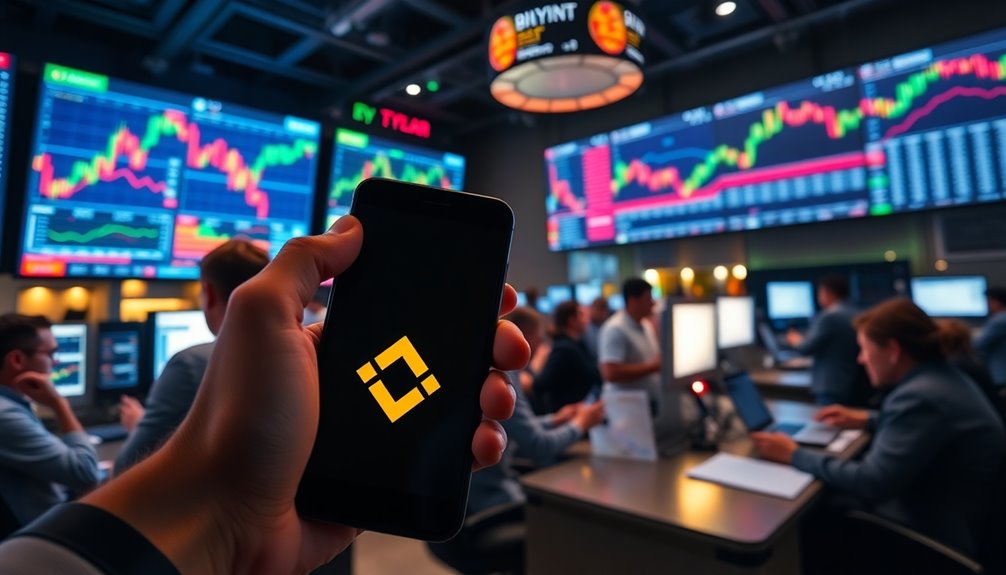You're in the midst of a major development as Binance prepares to face a class action lawsuit after the U.S. Supreme Court denied its petition for review. This ruling signals that U.S. securities laws apply to Binance, especially regarding claims it sold unregistered tokens to American investors. The Supreme Court's decision highlights significant legal challenges for Binance, which may result in heightened scrutiny and potential penalties. As more people take interest in the implications for cryptocurrency regulation, you might want to find out what this means for Binance and the broader crypto market moving forward.
Key Takeaways
- The U.S. Supreme Court upheld the 2nd Circuit Court's ruling, allowing the class action lawsuit against Binance to proceed.
- The lawsuit alleges Binance failed to disclose significant risks associated with their token offerings to U.S. investors.
- Binance's defense against the applicability of U.S. securities laws was deemed insufficient by the Supreme Court.
- The ruling signifies potential legal ramifications for foreign exchanges operating in the U.S. market.
- Increased regulatory scrutiny and ongoing legal battles could impact Binance's market strategies and operations.
Legal Challenges for Binance

As legal challenges mount for Binance, the exchange faces serious accusations regarding securities laws violations. You might be surprised to learn that Binance is accused of selling unregistered tokens, like ELF and TRX, to U.S. investors without proper registration. The 2nd U.S. Circuit Court of Appeals ruled that U.S. securities laws apply to Binance, especially since token purchases became irrevocable upon payment in the U.S. Additionally, Binance's use of Amazon Web Services strengthens this claim. Despite arguing that the Morrison case limits the reach of U.S. laws, the court found this argument inadequate. With the U.S. Supreme Court denying Binance's appeal, a class action lawsuit can now proceed, putting the exchange under significant scrutiny. The recent ruling could pave the way for more legal accountability for crypto exchanges operating in the U.S.
Supreme Court Denies Binance Appeal

With the U.S. Supreme Court's recent decision, Binance's appeal has been denied, leaving the 2nd Circuit Court's ruling intact.
This means the class action lawsuit filed by investors will proceed, which claims Binance failed to disclose significant risks tied to various tokens.
Binance argued that U.S. securities laws shouldn't apply to them, citing their operations outside the U.S. and referencing the Morrison v. National Australia Bank case.
However, the Supreme Court declined to delve into these arguments, effectively upholding the lower court's decision.
This ruling adds to the legal hurdles Binance faces, potentially leading to significant consequences if the investors prevail in their claims. The case also signals the potential applicability of U. S. securities laws to foreign exchanges, which could reshape regulatory frameworks in the cryptocurrency market. With increasing scrutiny from regulators, the situation could compel lawmakers to reassess the current regulatory landscape governing digital assets. In fact, as discussions around the implications of such rulings intensify, Senator Warren calls for stricter crypto regulations to ensure investor protection and market integrity. Should the investors succeed in their claims, it might pave the way for more rigorous enforcement measures and set a precedent for how foreign exchanges are governed in relation to U. securities laws.
Cryptocurrency Price Volatility Analysis

The recent Supreme Court ruling on Binance's appeal has heightened interest in the cryptocurrency market, particularly regarding price volatility.
Market sentiment plays a crucial role here; positive news can spark price surges, while negative reports often trigger sharp declines. Emotional trading driven by fear or greed amplifies these movements, leading to increased liquidity. Speculative behavior of retail investors contributes significantly to this volatility, as traders react impulsively to market shifts. Additionally, ambient temperature in the market can influence trading patterns, similarly to how it affects the efficiency of heat pumps.
When demand for cryptocurrencies rises, prices typically follow, but oversupply can result in drops, especially for assets like Bitcoin.
Security breaches also shake investor confidence, prompting sell-offs that further destabilize prices.
Lastly, regulatory changes can create major swings, as traders react to potential restrictions or bans, demonstrating just how intertwined sentiment, supply, and external factors are in shaping price volatility.
Corporate Blockchain Integration Trends

While many businesses are still exploring blockchain's potential, trends show a clear shift toward its integration across various sectors.
You'll notice that companies are enhancing value chain management through improved transparency and traceability, which builds trust among stakeholders. This tech not only boosts operational efficiency by cutting out intermediaries but also helps mitigate risks with unchangeable records. Additionally, companies are leveraging tokenization of assets to revolutionize how ownership is managed and monetized.
Moreover, the rise of decentralized finance (DeFi) is pushing innovation, offering businesses greater autonomy and flexibility in their financial operations.
However, challenges remain, such as a shortage of skilled experts and a need for user-friendly interfaces.
As blockchain becomes more interoperable with enterprise systems, it's clear that its corporate integration is gaining momentum, shaping the future of various industries.
Regulatory Scrutiny and Lobbying Efforts

As regulatory scrutiny intensifies, Binance finds itself navigating a complex landscape of legal challenges and lobbying efforts. You see, the SEC and DOJ are closely examining its compliance with U.S. laws, while the NYDFS investigates its BUSD stablecoin and acquisition of Voyager Digital. Heightened concerns over anti-money laundering failures compound these challenges, and multiple class action lawsuits have emerged. In response, Binance has ramped up its lobbying, spending over $1 million in just the first half of 2023. The exchange backs initiatives like the Digital Commodities Consumer Protection Act, aiming to clarify the regulatory framework for digital assets. Additionally, the ongoing scrutiny on product offerings has necessitated a reevaluation of Binance's market strategies. With Coinbase also leading in lobbying efforts, the crypto industry's future hangs in the balance as these regulatory dynamics unfold.
Market Adaptation Strategies Ahead

Navigating the volatile landscape of the crypto market demands that Binance adopts innovative market adaptation strategies to stay competitive.
You'll want to focus on user-centric product development, engaging with your global community through events and feedback mechanisms. Offering exclusive benefits and educational campaigns will drive user retention and adoption. To support this, Binance emphasizes user-friendly tools that enhance cryptocurrency adoption for all users. Additionally, utilizing data analytics will enable Binance to make informed decisions regarding user preferences and market trends.
Incentivizing participation through promotions, gamification, and loyalty programs can further enhance user engagement.
Localized marketing efforts tailored to regional preferences will help you resonate with diverse markets, while strategic partnerships with leading companies will expand your ecosystem. Collaborating with local influencers and hosting community events can significantly boost brand visibility.
These strategies will position Binance to thrive amid challenges and seize new opportunities in the ever-evolving crypto landscape.
Frequently Asked Questions
What Are the Implications of a Class Action Lawsuit for Binance Users?
A class action lawsuit against Binance can significantly impact you as a user.
If the lawsuit succeeds, you might receive compensation for losses tied to unregistered tokens and inadequate security measures.
This legal action could also lead to stricter regulatory scrutiny, affecting your confidence in using the platform.
Additionally, Binance's damaged reputation may prompt you to reconsider your investments in cryptocurrencies, especially if you're concerned about security and compliance issues.
How Will This Affect Binance's Global Operations and Partnerships?
Navigating through stormy seas, Binance's global operations and partnerships will face turbulent waters ahead.
As you watch, the company will tighten its compliance focus, adapting to a patchwork of regulations.
Strategic partnerships with financial institutions could become lifelines, helping them stay afloat.
Adjustments in operations will be crucial, and while legal costs may weigh them down, effective risk management could steer them toward calmer waters and a stronger market position.
What Are the Potential Outcomes of the Class Action Lawsuit?
The potential outcomes of the class action lawsuit could significantly impact Binance.
You might see financial consequences, such as hefty settlement costs and legal fees that could affect the company's stability.
Additionally, a negative ruling could damage its reputation and lead to increased regulatory scrutiny.
As the case unfolds, you could observe shifts in market confidence, prompting changes in industry standards and compliance requirements for cryptocurrency exchanges overall.
Will This Lawsuit Impact Binance's Listing of New Cryptocurrencies?
You'd think a lawsuit would do wonders for Binance's new cryptocurrency listings, but it's quite the opposite.
This legal challenge will likely tighten scrutiny and delay approvals, as compliance becomes paramount. Investors might hesitate, fearing a tarnished reputation, which could further impact market confidence.
As Binance reallocates resources to manage legal matters, the once-vibrant listing process may slow, leaving new projects in limbo while regulatory hurdles loom larger than ever.
How Can Users Protect Themselves During Ongoing Legal Proceedings?
To protect yourself during ongoing legal proceedings, start by reviewing all relevant legal documents and timelines.
Understand the legal terminology to make informed choices.
Safeguard your personal information by using secure methods for sharing data and encryption.
Monitor exchange activities for any suspicious transactions and verify compliance with KYC and AML policies.
Lastly, consult a legal professional to comprehend your rights and assess risks before participating in any class actions.
Conclusion
So, here we are—Binance, the crypto kingpin, facing a class action while the Supreme Court decides to take a coffee break on their appeal. Who knew the legal drama could rival a soap opera? As crypto prices bounce like a ball at a toddler's birthday party, Binance's blockchain dreams may just need a little more than wishful thinking. Buckle up, folks! It looks like the wild ride in the crypto world is just getting started.









